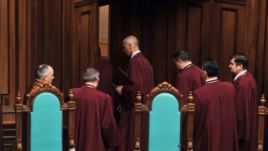Constitutional Court: MPs can initiate abrogation of international agreements

The Constitutional Court has found unconstitutional a law on amendments to the Verkhovna Rada Regulations which prohibited Natonal Deputies [MPs] from initiating abrogation of international agreements (amending Article 202 of the Regulations).
At a press conference on Thursday, reporting Judge Andriy Stryzhak called the CCU judgement entirely logical and foreseeable. He said that the amendments in question had been prompted by the wish at that time “to slightly amend the Constitution”, and that during the debate on the amendments no legal grounds had been heard, only emotional and political statements. They were trying, he says, to prevent anybody touching certain agreements and not submitting draft bills proposing to abrogate international agreements. This concerned in the first instance the Kharkiv Accords between Presidents Yanukovych and Medvedev. The latter extended the presence of the Russian Black Sea Fleet on Ukrainian territory for an additional 25 years supposedly in exchange for concessions on gas. The latter are generally understood to have not eventuated. The Accords were signed without any prior discussion or even notification on 21 April 2010, and ratified by the ruling majority on 27 April, 2010 following scenes of violence in parliament which made headlines throughout the world.
While this may all be as Judge Stryzhak says, it is difficult not to notice a strange coincidence: Prime Minister Azarov announced also on Thursday that Russia’s leaders have agreed to review the gas accords signed in January 2009. These were signed after Russia’s unilateral action in cutting off supplies to Ukraine led to gas not reaching a number of EU countries. In October 2011 former Prime Minister and opposition leader Yulia Tymoshenko was sentenced to 7 years imprisonment for the signing of the 2009 accords. The trial and sentence have been widely condemned as political persecution and unacceptable prosecution for a political decision.





